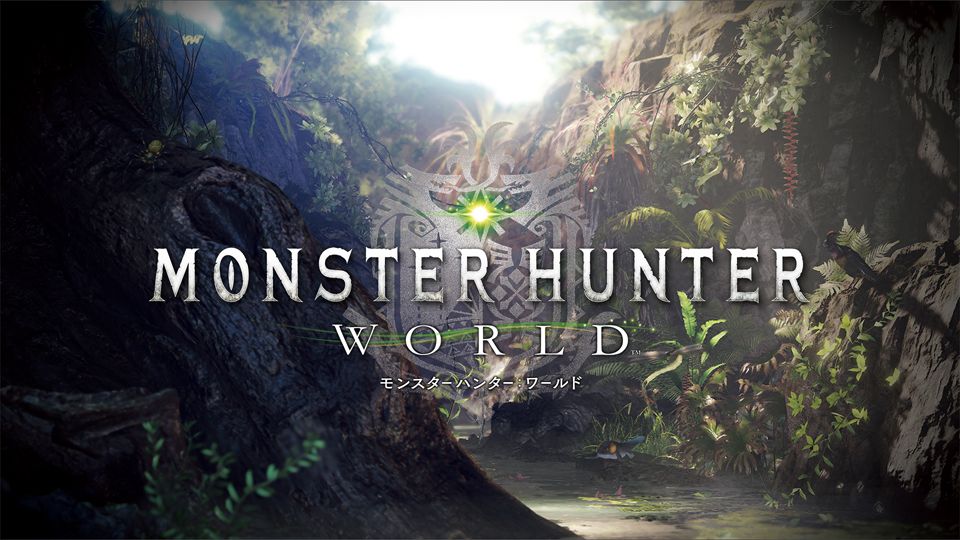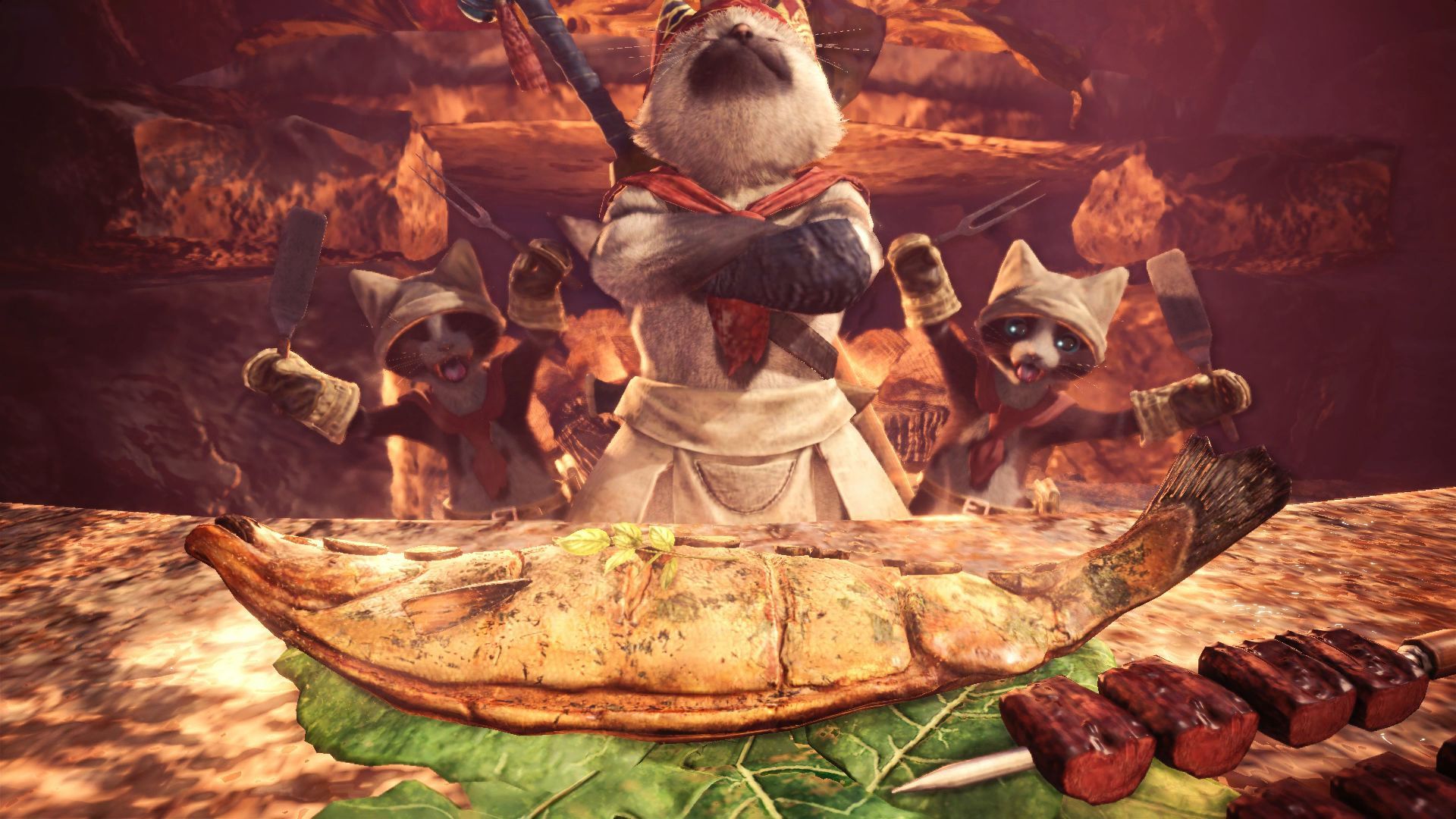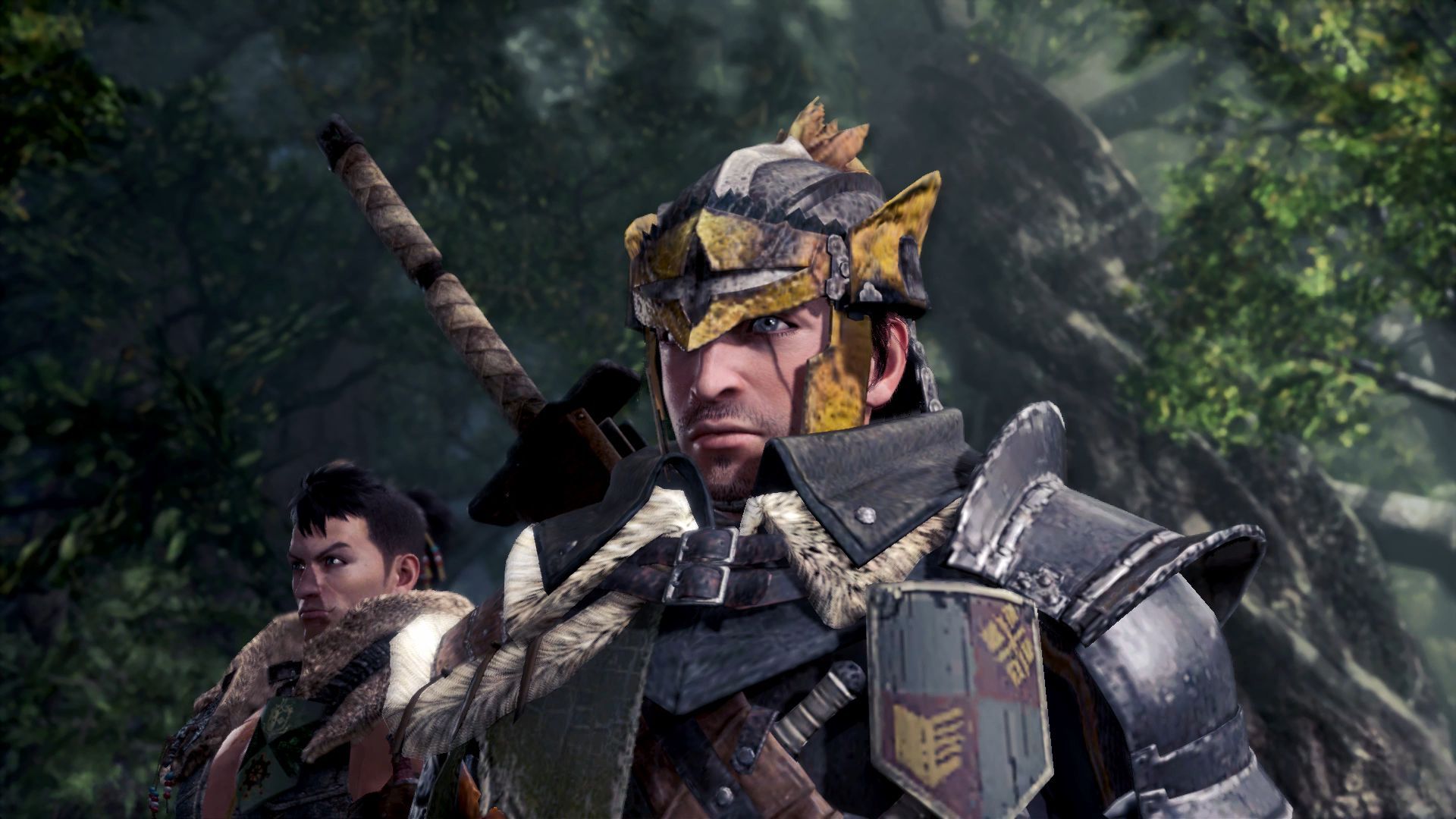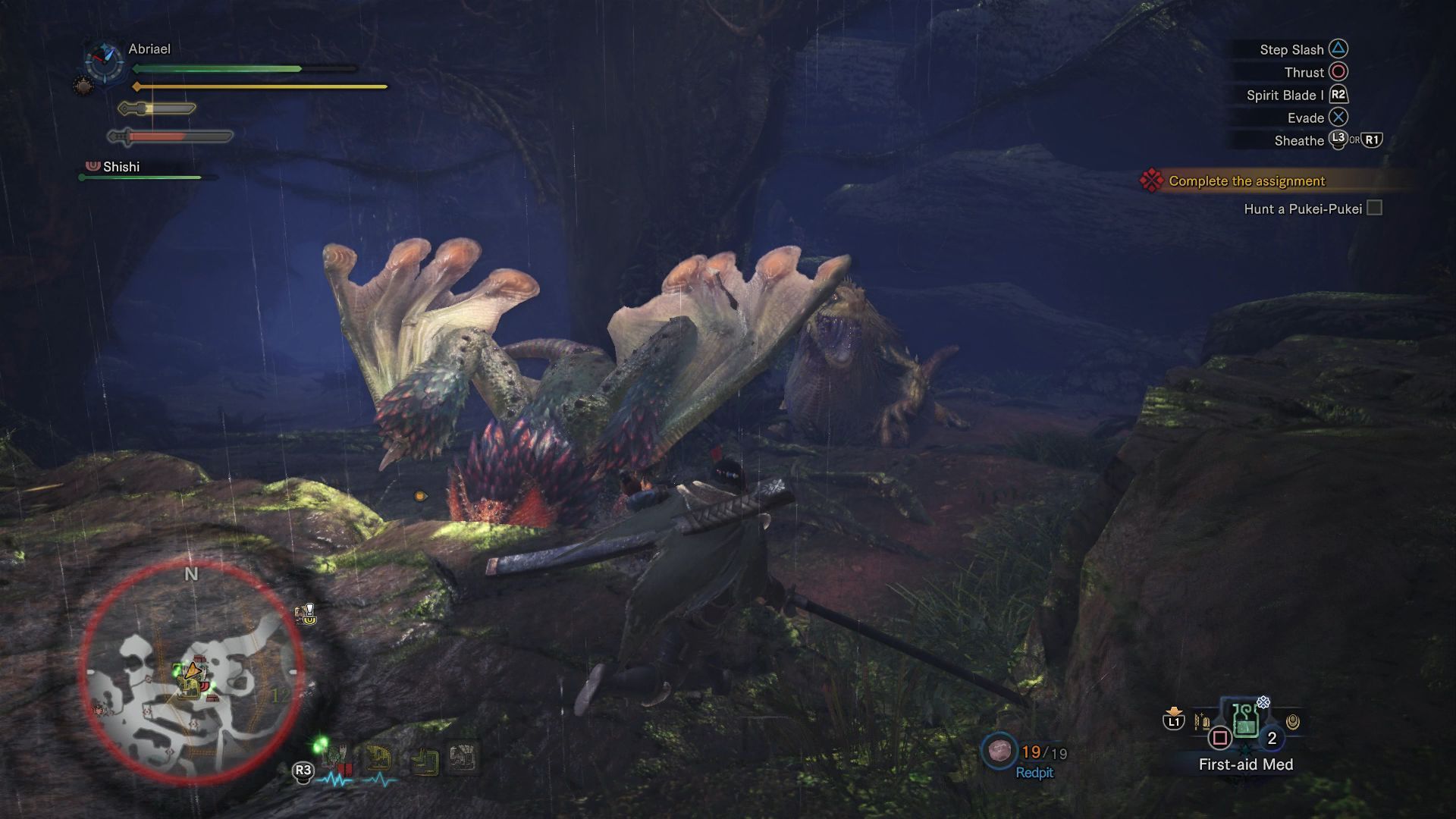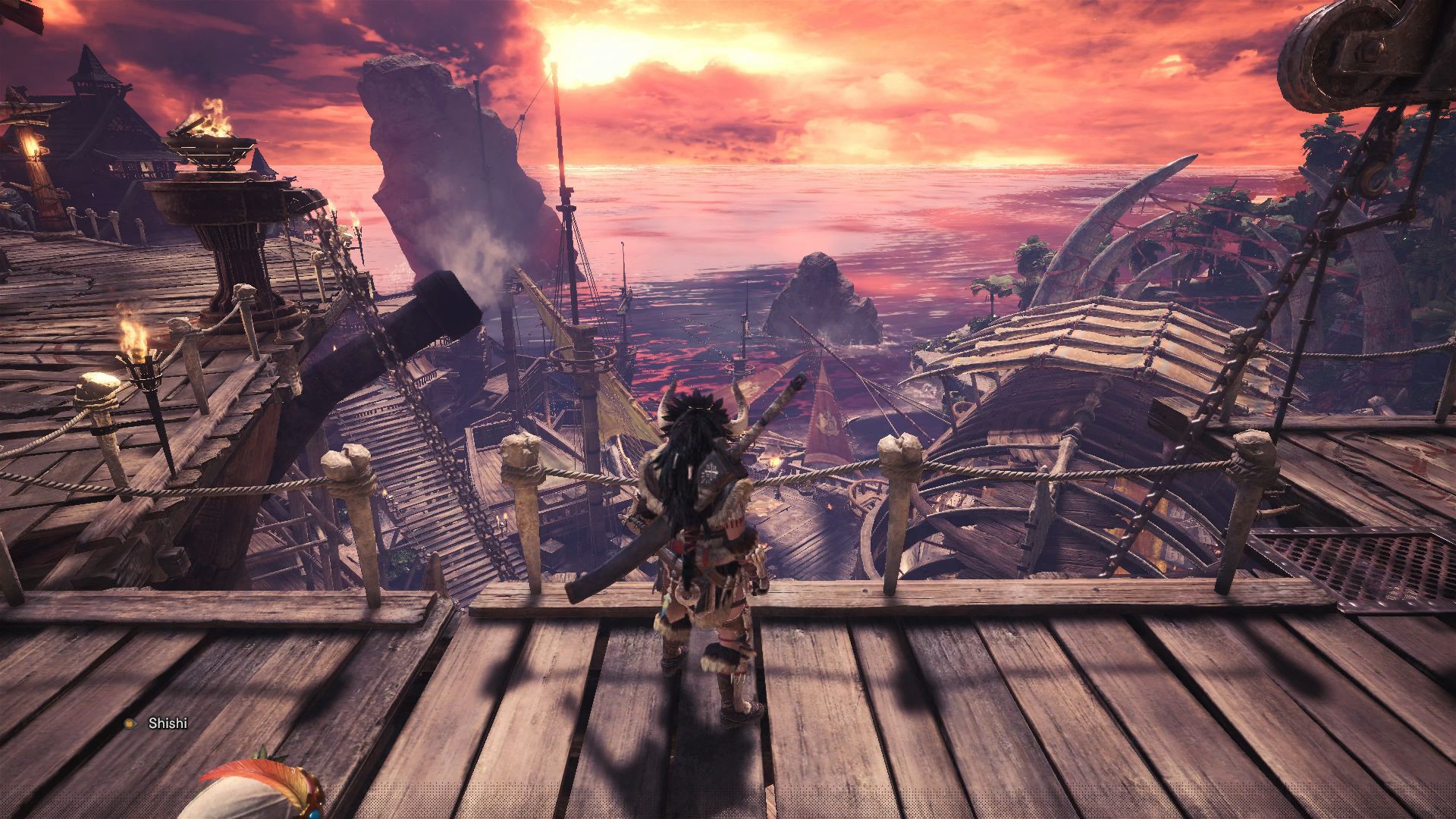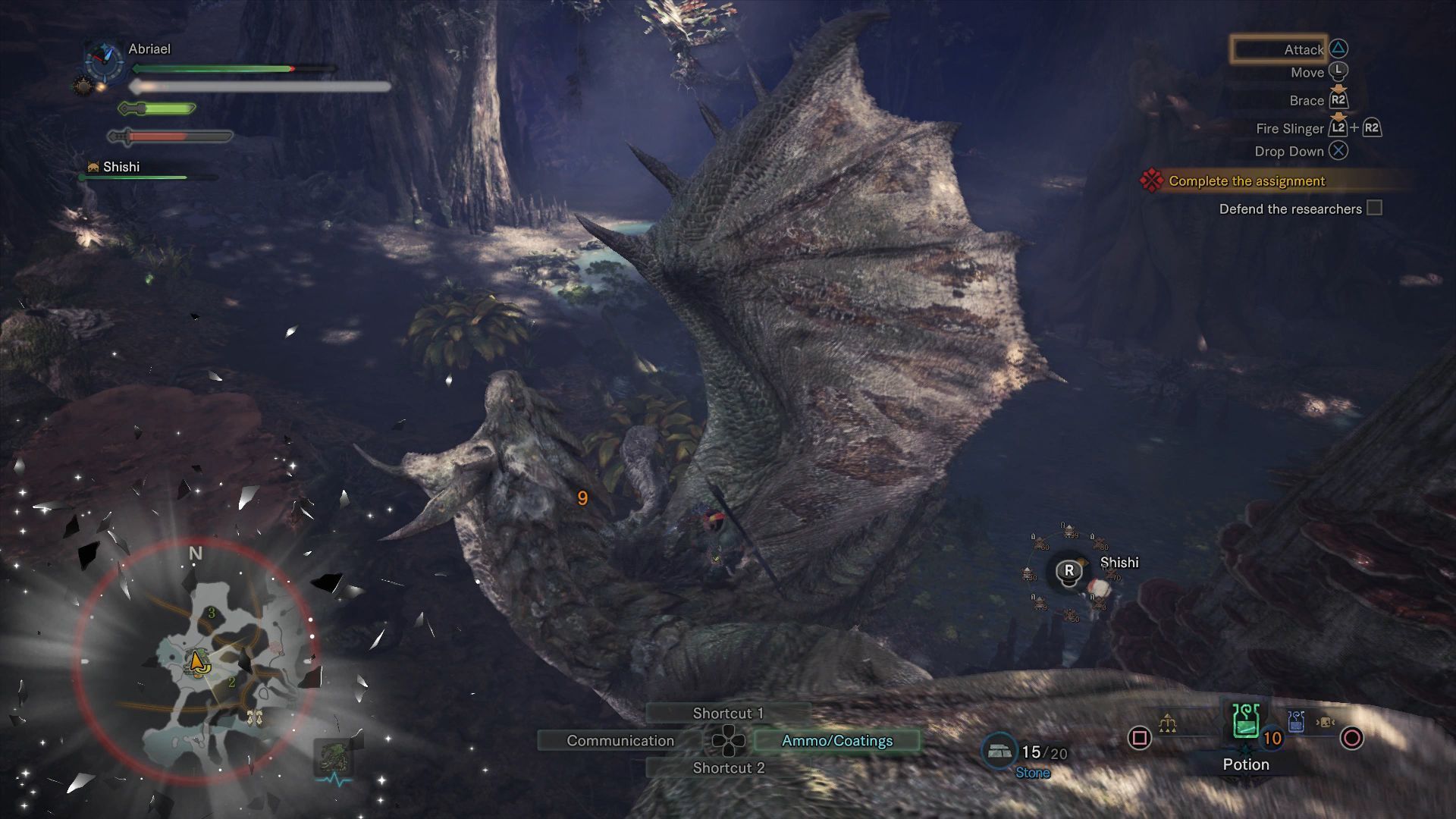Just six months have passed since the announcement of Monster Hunter: World at E3 2017, promising a revolution for the Monster Hunter franchise with the return to home consoles. The series has spent a long time on hardware that was underpowered for its time, and while the games were undoubtedly good or even great, without much under the hood it felt like it was limiting evolution and progress.
Now that a mainline chapter of the series is landing on PS4 and Xbox One, there is certainly the potential for a new direction, but does the game deliver on its hype and legacy?
The story starts on a ship of the Fifth Fleet headed to the New World, tasked with investigating the nature of a mysterious migration that prompts the Elder Dragons to convene there every ten years. As our silent hero is busy getting to know his new companions, a giant monster named Zorah Magdaros appears suddenly and wreaks havoc on the fleet.
As we barely manage to escape with our new partner (a handler that will follow us through our hunting adventures), we finally make landfall and reach our destination: the local settlement of Astera. There we discover that Zorah Magdaros might be connected to the Elder Migration, and we begin investigating the mysteries of our new and savage home.
The story is the first significant difference among previous Monster Hunter games. It's deeper and much more relevant, told both through high-quality cutscenes and extensive dialogue during gameplay. We could say that it's finally on par with the narrative one would expect from a JRPG, which is what this game fundamentally is.
[pullquote]"The deeper storyline helps to make the hunts feel more connected and meaningful."[/pullquote]
Not only does it makes the title more enjoyable than its predecessors, but it helps players become more immersed in the world and invested in the hunting. While killing monsters of varying sizes and nature are still done for loot and glory, the deeper storyline helps to make the hunts feel more connected and meaningful.
Both narration and hunting are also accompanied by a high-quality soundtrack, which does well to underline the savage nature of the locations and the semi-primitive lifestyle of the hunters with tunes that range from epic to tribal.
Audio design is also great, especially when we're talking about the natural sounds of the environment and of the monsters that populate it. It certainly contributes to making the world feel as though it were living and breathing, and this is a concept that you'll read about often in this review.
Voice acting is another laudable aspect if anything in the fact that the game comes with a large number of languages, including Japanese and the traditional Monster Hunter one. Not only is the quality quite high across the board (and very high in Japanese, even if the localization is a bit too "creative" at times, with evident discrepancies with the English subtitles) but the diversity of choices is top-notch.
[pullquote]"Monster Hunter: World looks absolutely amazing, in basically every aspect."[/pullquote]
Unfortunately, not every line of dialogue is accompanied by voice acting, with secondary scenes being text-only, as is often standard in Japanese games.
I feel I'm stating the obvious, but the graphics are certainly another substantial difference compared to previous games of the series. Monster Hunter: World looks absolutely amazing, in basically every aspect.
Characters are well designed not only from a purely visual standpoint but also in expressiveness and uniqueness. You'll soon learn to know and love your companions, and the palicoes are the most adorable thing that has ever walked on two legs. Even the gruff and musclebound cook with one eye and the related scar is so cute that you'd want to cuddle and squeeze him for hours.
Another positive aspect related to the game's characters is the deep hunter and palico customization suite, that lets you create your hero or heroine and their buddy with a comprehensive amount of freedom and depth.
[pullquote]"Every corner of the world is so rich and teeming with life, that it's very easy to waste hours just exploring."[/pullquote]
It's hard to define the environmental design of Monster Hunter: World as anything less than "crazy." Even this isn't just a matter of visual fidelity; while the environment is great on its own, what really shines is the art direction. No matter where you look, whether you're within the walls of Astera or in each of the uniquely designed and vast hunting areas, there will always be a myriad of elements and details moving around and competing for your attention. Every corner of the world is so rich and teeming with life that it's very easy to waste hours just exploring and searching for minutiae that the developers decided to include.
Of course, the monsters aren't any less detailed, with fantastic models and textures that are beautifully animated at every given moment. The development team went to great lengths to make them feel alive, and they certainly succeeded. The team definitely managed to make them look scary and intimidating, especially in the momentum and mass of the bigger critters. It's almost a pity that you're often too distracted fighting for your life to catch every small detail and nuance of their behavior.
The one small flaw is that collision detection is at times a bit wonky, with models clipping within each other during the most heated fighting scenes. This combines with a camera system that can struggle when things get really hectic in cramped environments to make following what's happening a bit harder than it should be in certain situations.
Animations also seldom tend to struggle with a difference in elevation, which can be slightly immersion-breaking when monsters transition a bit weirdly over a rock or a ledge.
That being said, I'm hesitant to judge this too harshly, as the world is so complex and combat is so hectic, that I'm not entirely sure that achieving a much better result with this level of detail is even doable.
[pullquote]"You never truly know what could happen just a few minutes down the line."[/pullquote]
One of the largest innovations of the game is the way in which the monsters interact with each other and with the environment. The development team pulled all the stops to make Monster Hunter: World feel genuinely like a living and breathing place. Monsters and animals go about their life regardless of the player, and it isn't rare to see them fighting each other.
Those fights are definitely spectacular and add an element of unpredictability and a further layer of tactics to the gameplay. It's entirely possible to take advantage of the presence of predators or prey to distract or damage targets, but it's just as likely that not paying enough attention to the surrounding might lead players under the claws and fangs of said additional predators that happen to come by.
This makes each fight more tense and exciting, as you never truly know what could happen just a few minutes down the line. Your target might run into an apex predator that will make a mess of it, or you might be the one getting messed up by a wandering monster that could be way bigger than the one you're hunting.
Core combat gameplay saw sizable evolution as well. While it feels still familiar, and the pace remains similar to that of traditional Monster Hunter games, controls are way smoother and more manageable. This may be partly because the DualShock 4 (and I'm sure the same goes for the Xbox One controller, even if I have not tested it) is a massively superior control solution compared to the minuscule sticks and limited ergonomy of a portable console.
One of the most welcome aspects--that did not change--is the sheer variety of weapons that players can enjoy: this includes both melee and ranged implements of destruction, on top of more peculiar contraptions that novices might find akin to the trick weapons in Bloodborne.
Each of the 14 weapons has its own strengths and weaknesses, a specific move-set, and a completely unique personality. There is so much variety that it's almost impossible not to find at least one weapon that fits your taste. Whether you like to specialize in one or to dance between multiple, there is much to learn and to enjoy.
[pullquote]"One of the most welcome aspects that did not change is the sheer variety of weapons that players can enjoy."[/pullquote]
Combat itself places a high emphasis on skill over stats. Even with great equipment, you'll find yourself hard pressed if you underestimate your target, but good hunters with patience and perseverance will be able to defeat monsters far beyond the level of their equipment.
You could say that battles against the most powerful monsters feel almost as challenging as those in the Souls series but without the frustration. Encounters are designed to test your skills and ability to read and learn each enemy, but they're still fun and exhilarating, and not purely difficult for the sake of being difficult.
The one word of caution I need to spend on this aspect is that killing many of the monsters is a long process. If you like combat systems in which enemies fall quickly, this is most probably not the game for you. Fighting giant dinosaurs and dragons isn't a two-minute engagement for chumps.
[pullquote]"This is one one of the very few games I experienced that are designed for multiplayer, in which that doesn't detract at all from single player."[/pullquote]
Another critical element of Monster Hunter: World is the emphasis on co-operative multiplayer. Pretty much everything is designed to be enjoyed with friends, and (besides a few small quirks) the game's systems do a pretty good job of making this seamless thanks to the ability to drop into other people's game or to summon help whenever you need it via flares. The communication suite is also full-featured and well rounded, allowing you to coordinate with your companions effectively whether you're using voice chat or not.
Tackling giant monsters with other hunters is perhaps even more fun than doing it alone, with battles that become even more hectic and exhilarating, and tactical situations made more complex and interesting by the presence of relatively unpredictable human players and by the variety of weapons in play.
That being said, if you don't feel like being social, you don't need to worry. The game is entirely playable and fully enjoyable on your own. As a matter of fact, this is one one of the very few games I experienced that are designed for multiplayer, in which that doesn't detract at all from single player. I can't remember a single time in which playing on my own felt like a handicap or any less rewarding.
While Monster Hunter: World is a massive game, which will offer several tens of hours of gameplay and a ton of activities to enjoy even beyond the core hunting, it isn't as big as some of its predecessors. Especially the number of monsters appears smaller. This is quite understandable as creating their assets for current generation platforms takes an overwhelmingly larger amount of time and resources compared to designing them for a platform like the 3DS. Capcom went for a quality-over-quantity approach, and it certainly feels like the right choice, especially if you consider that the game is still much larger than the vast majority of AAA titles out there.
Free updates will also expand it even further, so it's quite likely that even veteran hunters will be kept busy for a long time. Combine this with an exceptional level of polish at launch, and we have a winner.
Monster Hunter: World is a brave new step in a refreshing direction for a beloved franchise that has been plagued for too long by antiquated hardware and confined into a niche by lack of promotion in the west. Even more impressive is that Capcom did much more than taking the easy way out and simply improving the graphics.
Monster Hunter World
- Franchise
- Monster Hunter
- Released
- January 26, 2018
- Developer(s)
- Capcom
- Publisher(s)
- Capcom
- Genre(s)
- Action RPG
- ESRB
- T for Teen: Blood, Mild Language, Use of Alcohol, Violence
- Expansions
- Monster Hunter World: Iceborne

